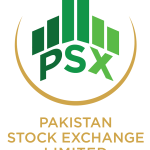 Moving along the trend set in motion in previous week, Pakistan Stock Exchange posted negative performance throughout the week. On last trading day of the week ended on 24th September 2021, bench mark index closed at 45,073 points, touching a low of 44,788 points. Over the outgoing week, the index cumulatively lost 1,562 points or 3.4%. A 25bps hike in interest rates by the central bank suggests further hikes in future.
Moving along the trend set in motion in previous week, Pakistan Stock Exchange posted negative performance throughout the week. On last trading day of the week ended on 24th September 2021, bench mark index closed at 45,073 points, touching a low of 44,788 points. Over the outgoing week, the index cumulatively lost 1,562 points or 3.4%. A 25bps hike in interest rates by the central bank suggests further hikes in future.
Other major news flows during the week included: 1) the central bank tightening regulations on consumer financing and mandating banks to share 5-day import payments schedule, 2) the GoP considering re-imposing higher regulatory duties to curb auto imports, 3) Petroleum division proposing to increase gas prices by up to 35 percent, 4) Pakistan planning to issue international Sukuk in October 2021 to raise US$1.5 billion and 5) EU extending GSP+ status for Pakistan with six new conventions.
Volumes relatively dried up with average daily turnover sliding to 383.5 million shares as against 400.1 million shares a week ago. Major activity tilted towards main board items. Pressure was witnessed across sectors, with Engineering hit the most, registering a decline of 6.3%WoW followed by Auto Assemblers, down 5.9%WoW. Refineries emerged the worst performer (down 17.2%) over uncertainty on refinery policy. The resignation of SAPM Tabish Gauhar, the architect of the Policy, hints towards possible delays in finalization of the Policy.
Flow-wise, Foreigners and Others played a major role in absorbing selling pressure by other participants, with cumulative net inflow at US$12.6 million, while Individuals and Companies cumulatively squared US$11.0 million positions. The major gainers were: HMM, PSEL, SCBPL, ARPL and SNGPL, while laggards were, ANL, ATRL (down 17.9%WoW), BYCO, PAEL and BNWM.
Market is likely to remain volatile in the near term, direction to be determined by IMF review. Reversing certain incentives such as in the case of Autos should be viewed as material positive particularly from a macro perspective, easing pressure on external account. Moreover, investors should adopt a top-down approach to investing where possibility of further interest rate hikes could bring Banking Sector into limelight, while Techs and Textiles (on currency depreciation where stronger earnings are yet to be priced in) are other sectors of interest. Techs may remain under pressure owing to structural impediments faced by one of the companies. The weakness should be taken as an opportunity to accumulate.